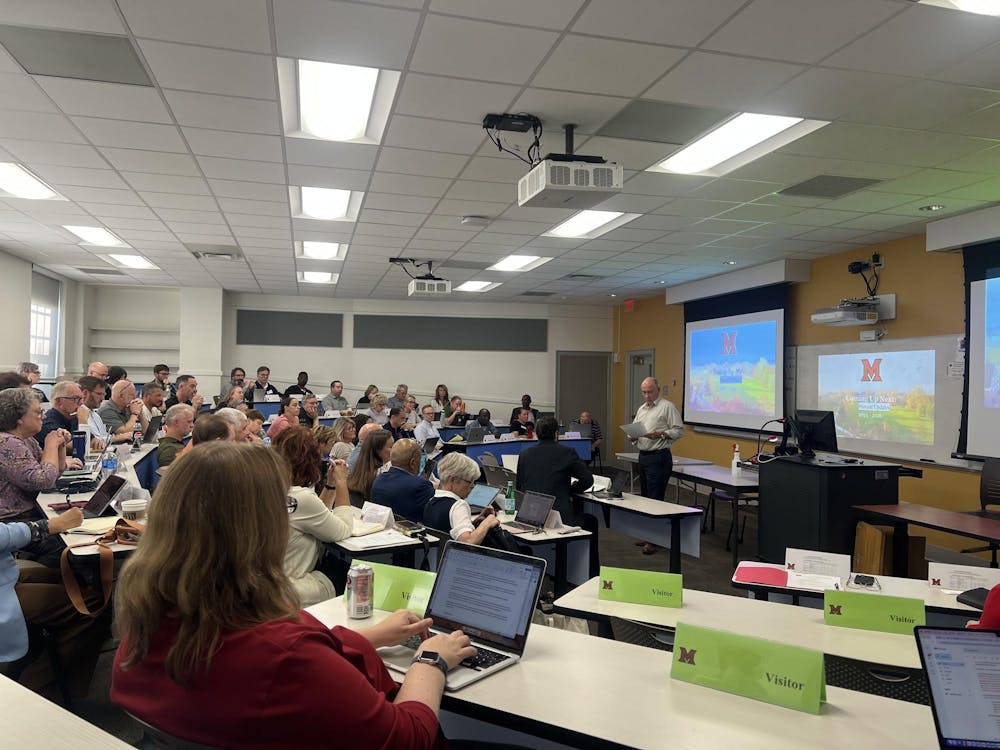University Senate met for the first time this semester on Sept. 8 with a long agenda after a summer of state legislation updates. Specifically, the effects of Ohio Senate Bill 1 (S.B. 1) that went into effect on June 27, 2025.
The Advance Ohio Higher Education Act, inside of S.B. 1, established new requirements at Miami University, which left all eyes on the Board of Trustees.
S.B. 1 gives the Board of Trustees at each state institution of higher education ultimate authority to establish new academic programs, schools, colleges, institutes, departments and centers, according to the law.
They must adopt a curricular approval process to establish and modify academic programs, curricula, courses, general education requirements and degree programs. Chris Makaroff, Miami’s provost, said during the senate meeting that the Board of Trustees has been “empowered to do whatever the hell they want.”
This new law allows the University Senate to “provide advice, feedback and recommendations,” while the board has “final, overriding authority” for the curricular approval process, which goes into effect on Sept. 30, according to the Ohio Revised Code.
Previously, the Board of Trustees would delegate to the University Senate, giving it the primary responsibility for curriculum, programs and course offerings as well as advisory responsibility on all matters related to Miami.
Enjoy what you're reading?
Signup for our newsletter
This leaves the University Senate unaware of its role in decision-making, and at the meeting, some members voiced their concern about what it can still do.
“There are several senators who are in this room, and outgoing senators – all of them have expressed that this body has become listless in the last few years as executive decision-making in the institution,” said Nathan French, the senate chair and a professor in the Department of Global and Intercultural Studies. “This is our chance to reenvision what that advisory capacity for this body will look like. If we do it well, we reintegrate ourselves as an indispensable part of the institution.”
As well as shifts in power, S.B. 1 establishes the new American Civic Literacy requirement. This new requirement is to develop a course with at least three credit hours in the subject area of American civic literacy. The course will cover the American economic system and capitalism.
Students will also be required to read foundational documents such as the Constitution of the United States, the Declaration of Independence, the Federalist Papers and more. This will go into effect for students graduating in Spring 2030 and beyond, so there are no changes to degree requirements for students graduating before then.
Marko Dumančić and Elizabeth Wardle spoke about integrating this course into the Miami Plan, but there is a lingering question of where it will fit.
“Things being what they are… now what?” Wardle asked during the meeting.
The motion passed to create an Ad Hoc Committee to amend the Enabling Act to comply with the law. Three representatives from the senate, Kevin Reuning, Cheryl Young and Thomas Poetter, all accepted their nominations to serve on this committee. The remaining membership of the committee is still to be decided. They are to sit for their first meeting no later than Sept. 15.
“Our senate is an indispensable part of this institution; that should be our aspiration, that should be our goal,” French said. “We’re not a site for mere voluntary service, inspiration, or consensus taking, but we act to achieve consensus on all matters of university business brought to our attention.”
The University Senate's next meeting will be at 3:30 p.m. on Sept. 22 in 111 Harrison Hall.




